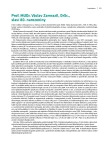-
Medical journals
- Career
The SPACE project (Stav Pacientů Akceptovaných diabetologem Cestou Exportu/The Health Records of Patients Accepted by a Diabetologist by way of Export)
Authors: Milan Kvapil
Authors‘ workplace: Interní klinika 2. LF UK a FN v Motole, Praha
Published in: Vnitř Lék 2016; 62(Suppl 3): 22-27
Category: Original Contributions
Overview
Introduction:
A structured care of patients with diabetes is in place in the Czech Republic and the majority of patients are followed up by a diabetologist in outpatient diabetes units. The SPACE project (The Health Records of Patients Accepted by a Diabetologist by way of Export) was initiated to address the lack of the data which would allow for objective evaluation of how the cooperation in the care of patients with diabetes works in the real-life health care practice in the Czech Republic.Goal:
Gaining the description of anthropometric parameters, presence of complications, the chosen therapy and metabolic state of patients registered for diabetes specialist care. Secondary goals involved identification of the average duration of diabetes at the first patient visit to the outpatient diabetes clinic, prevalence of diabetes-related complications on the registration for diabetes care, the structure of pharmacological therapy for diabetes, hypertension, hyperlipoproteinemia.Methodology:
Retrospective collection of data for the first 20–25 patients, who were consecutively registered in diabetes outpatient clinics from 1 January 2015 onwards.Results:
778 complete questionnaires were included in the analysis. The greatest number of patients were referred by the general practitioner (64.5 %). Over 55 % of the patients were aged 50–69, less than 10 % were up to 40 years of age. 95.6 % of all cases involved type 2 diabetes mellitus. In almost 65 % of the cases duration of diabetes before registration for diabetes care is up to 2 years. There were 433 late complications recorded in 272 patients of the total number of 778 patients. 506 patients (65 %) had no late complications. Three most frequently occurring complications were ischemic heart disease (18.6 %), diabetic neuropathy (7.8 %) and stroke (5.5 %). The analysis of pharmacotherapy shows a significant increase in the use of the followed drugs after visiting a diabetologist (74.9 % before the diabetes visit and 96.7 % after the visit). Antidiabetic drugs or insulin were taken by 48.3 % of patients before the diabetologist visit, and they were taken by 92.5 % of patients after the first diabetologist visit.Key words:
diabetes mellitus – epidemiology of diabetes mellitus complications – glycated hemoglobin – diabetes mellitus therapy
Sources
1. Informace dostupné z WWW: http://www.uzis.cz.
2. Algoritmus postupu péče o pojištěnce s diabetem 2. typu. Věstník MZ č. 8/2010 z 1. 7. 2010. Dostupné z WWW: http://www.mzcr.cz/legislativa/dokumenty/vestnik-c_4025_1770_11.html. [29.8. 2016]
3. Národní diabetologický program 2012 – 2022. Dostupné z WWW: http://www.diab.cz/dokumenty/NDP_2012_2022_PDF.pdf. [29. 8. 2016].
4. Janíčková-Žďarská D, Honěk P, Dušek L et al. Analysis of the development of metformin and sulfonylurea prescriptions in the Czech Republic. Vnitř Lék 2015; 61(11 Suppl 3): 3S25–3S29.
5. Brož J, Honěk P, Dušek L et al. The mortality of patients with diabetes mellitus using oral antidiabetic drugs in the Czech Republic decreased over the decade of 2003–2013 and came closer to the population average. Vnitř Lék 2015; 61(11 Suppl 3): 3S14–3S20.
6. Škrha J. Epidemiologická studie o diabetu mellitu v České republice. Porovnání výsledků z roku 2002 a 2006. DMEV 2013; 13(2): 55–62.
7. Edelman S, Pettus J. Challenges associated with insulin therapy in type 2 diabetes mellitus. Am J Med 2014; 127(10 Suppl): S11-S16. Dostupné z DOI: <http://dx.doi.org/10.1016/j.amjmed.2014.07.003>.
8. Informace dostupné z WWW: http://www.dm2t.cz/fejeton/121/editorial-22–2016-narodni-diabetologicky-informacni-system-je-na-dohled/. [29. 8. 2016]
Labels
Diabetology Endocrinology Internal medicine
Article was published inInternal Medicine

2016 Issue Suppl 3-
All articles in this issue
- Iodine supply of pregnant women in the Czech Republic
- Thyroid cancer in children and adolescents and its molecular genetic background
- Endocrine complications of modern cancer therapy
- Levothyroxine therapy – factors influencing its outcome
- Endocrine orbitopathy – the topic still alive
- Are the thyroid hormones and thyrotropin associated with cardiometabolic risks and insulin resistance even in euthyroid subjects?
- Current and future therapy of acromegaly
- Cardiorenal syndrome – biomarkers and mediators
- TSH secreting adenomas
- Central Thyroid Disorders
- Vitamin D and Polycystic Ovary Syndrome
- Thyroid hormones and cardiovascular system
- The endocannabinoid system and bone
-
Solution of Iodine deficiency in the Czech Republic – history and current situation
20 years of work of prof. Václav Zamrazil for Commission for the solution of Iodine deficiency - Psycho-immuno-endocrinology of the thyroid gland
- Thyroid carcinomas – current therapeutic procedures
- Vitamin D and autoimmune thyroid diseases
- Testosterone and mortality
- Congenital Adrenal Hyperplasia in Adults
- Polypharmacy viewed not only through the prism of multi-morbidity, but also as an independent geriatric syndrome
- Multiple Endocrine Neoplasia I (Wermer‘s Syndrome), Forms of Clinical Manifestation, 5 Case Studies
- The course of differentiated thyroid microcarcinoma in patients treated by different therapeutic strategies
- The SPACE project (Stav Pacientů Akceptovaných diabetologem Cestou Exportu/The Health Records of Patients Accepted by a Diabetologist by way of Export)
- Iodine supply and iodinuria among the Czech population between the years 1995 and 2016
- Urinary iodine concentration in adult patients with type 1 diabetes mellitus
- Internal Medicine
- Journal archive
- Current issue
- Online only
- About the journal
Most read in this issue- Congenital Adrenal Hyperplasia in Adults
- Multiple Endocrine Neoplasia I (Wermer‘s Syndrome), Forms of Clinical Manifestation, 5 Case Studies
- Vitamin D and autoimmune thyroid diseases
- Central Thyroid Disorders
Login#ADS_BOTTOM_SCRIPTS#Forgotten passwordEnter the email address that you registered with. We will send you instructions on how to set a new password.
- Career

